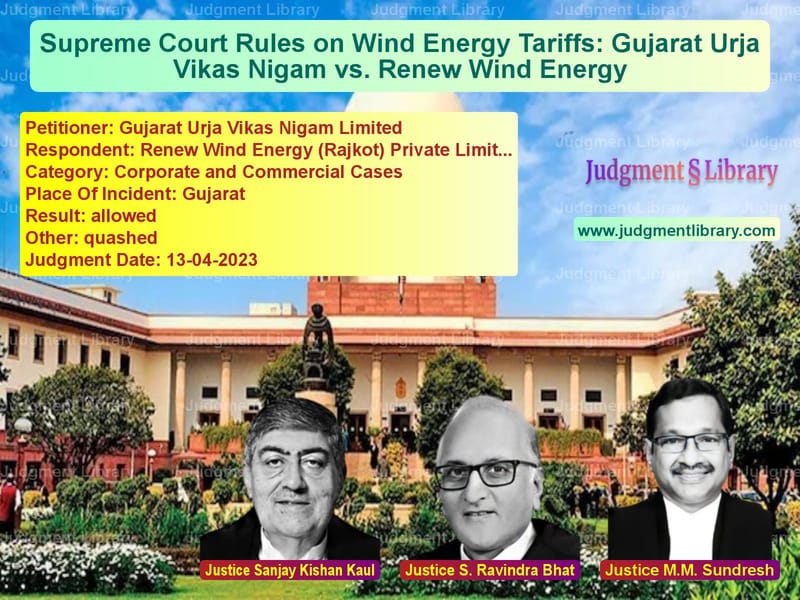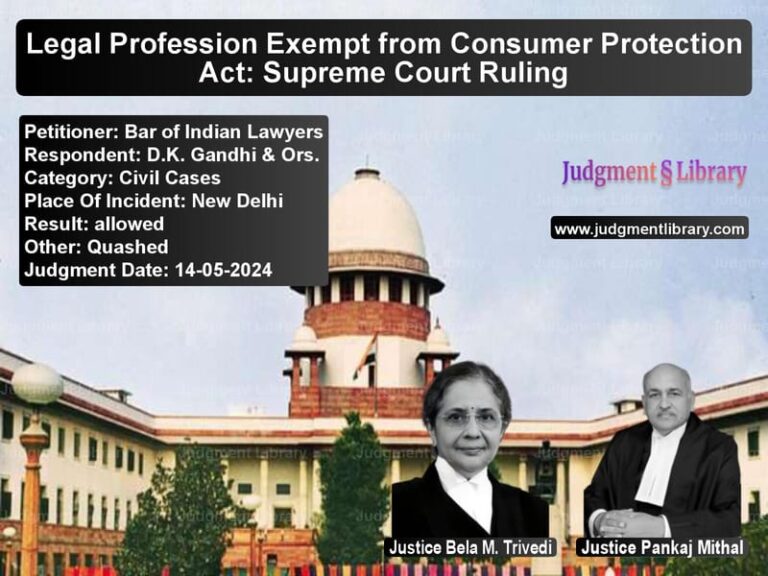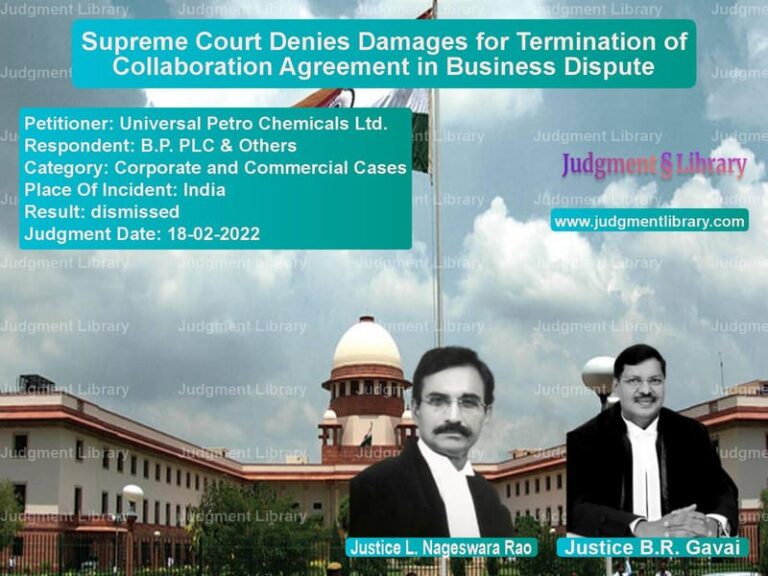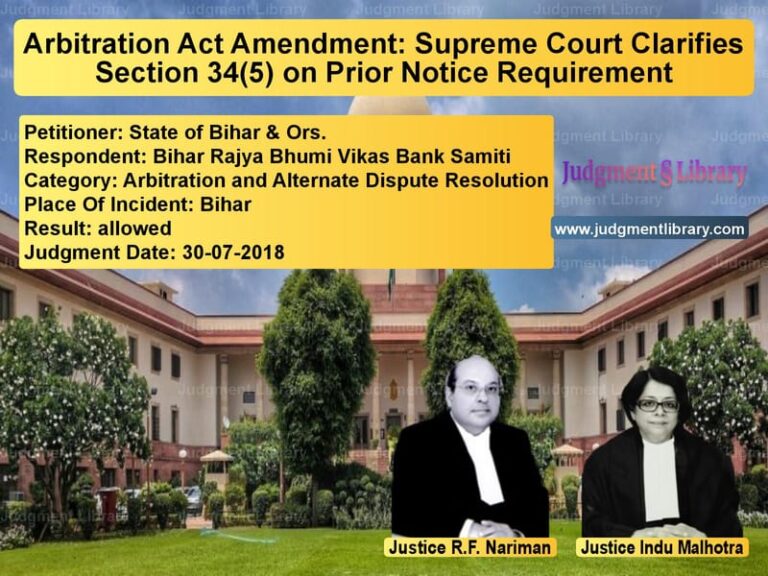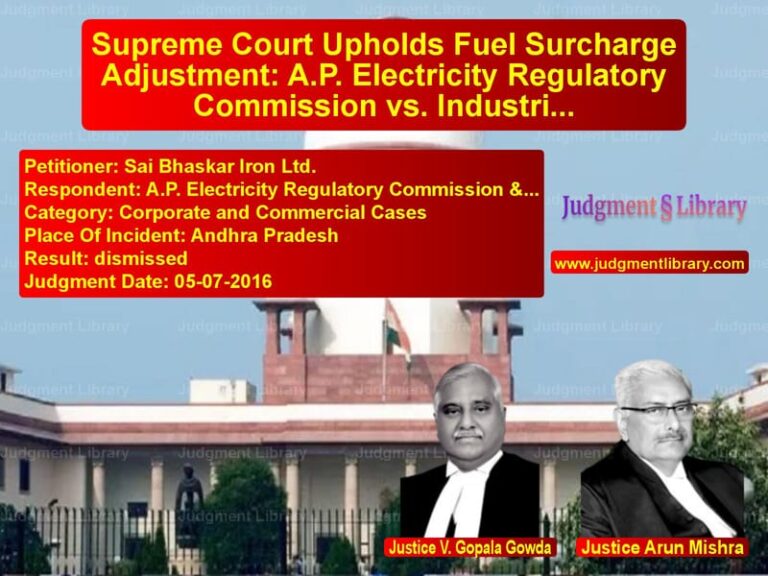Supreme Court Rules on Wind Energy Tariffs: Gujarat Urja Vikas Nigam vs. Renew Wind Energy
The Supreme Court of India has delivered a significant judgment in the case of Gujarat Urja Vikas Nigam Limited & Ors. vs. Renew Wind Energy (Rajkot) Private Limited & Ors., addressing critical issues related to renewable energy tariffs and the jurisdiction of regulatory bodies. This ruling clarifies the role of power purchase agreements (PPAs), the applicability of regulatory amendments, and the limitations of state commissions in modifying contractual terms.
Background of the Case
Gujarat Urja Vikas Nigam Limited (Gujarat Urja) is an authorized licensee responsible for bulk power procurement on behalf of distribution licensees in Gujarat. Renew Wind Energy (RWE) is a wind power generator that had set up 25.2 MW Wind Turbine Generators in Rajkot under the Renewable Energy Certification (REC) scheme notified by the Central Electricity Regulatory Commission (CERC).
The dispute arose from a Power Purchase Agreement (PPA) executed between Gujarat Urja and RWE on March 29, 2012. The agreement specified a fixed tariff of Rs. 2.64 per unit for 25 years. However, in 2013, amendments to the REC regulations altered the tariff determination criteria, prompting RWE to seek a revision of the PPA’s terms.
Legal Proceedings
State Commission’s Decision
RWE filed a petition before the Gujarat Electricity Regulatory Commission (GERC) in December 2013, arguing that the tariff should be revised in accordance with the amended REC regulations. The State Commission ruled in favor of RWE, directing Gujarat Urja to revise the tariff terms.
Appeal Before APTEL
Gujarat Urja appealed the GERC order before the Appellate Tribunal for Electricity (APTEL). However, APTEL upheld the State Commission’s ruling, emphasizing that the amendment to the REC regulations applied retrospectively, thereby justifying the tariff revision.
Supreme Court’s Intervention
Aggrieved by the APTEL decision, Gujarat Urja approached the Supreme Court, challenging the retrospective application of the REC amendment and the validity of modifying an existing PPA.
Arguments of the Parties
Arguments by Gujarat Urja
- The PPA was executed in 2012 under the existing REC regulations, which provided for a fixed tariff.
- The amendments introduced in 2013 should not be applied retrospectively to modify an agreement already in place.
- The State Commission lacked jurisdiction to alter a contract voluntarily entered into by both parties.
- Revising the tariff would impose an undue financial burden on consumers.
Arguments by Renew Wind Energy
- The amendment to the REC regulations mandated that the purchase price should align with the pooled cost of power purchase, which changes annually.
- Allowing a fixed tariff would disrupt the economic viability of REC-based wind projects.
- The State Commission had the authority to ensure compliance with regulatory frameworks and could intervene to modify contracts where necessary.
- The change in tariff structure was essential to maintain parity with market conditions.
Supreme Court’s Observations
The Supreme Court bench, comprising Justices Sanjay Kishan Kaul, S. Ravindra Bhat, and M.M. Sundresh, made the following key observations:
- “The contract between Gujarat Urja and Renew Wind Energy was executed under a legal framework that did not provide for retrospective changes.”
- “Regulatory amendments cannot override existing contracts unless expressly stated.”
- “The REC amendment of 2013 does not apply retrospectively to PPAs signed before its enactment.”
- “The State Commission exceeded its jurisdiction by modifying an existing agreement that was legally valid and voluntarily executed.”
- “The Appellate Tribunal for Electricity erred in upholding the retrospective application of the amendment.”
Final Judgment
The Supreme Court ruled:
- The Gujarat Electricity Regulatory Commission’s order modifying the PPA was set aside.
- The APTEL decision upholding the tariff revision was overturned.
- The original PPA terms, specifying a fixed tariff of Rs. 2.64 per unit, were reinstated.
Implications of the Judgment
This ruling has far-reaching implications for the energy sector and regulatory authorities:
- Contractual Sanctity: The judgment reinforces the principle that contracts voluntarily executed under existing regulations cannot be altered retroactively.
- Limits on Regulatory Overreach: The ruling sets a precedent that regulatory bodies cannot unilaterally modify agreements beyond their jurisdiction.
- Stability in Renewable Energy Investments: Investors in renewable energy projects can have confidence that their agreements will not be arbitrarily revised based on subsequent regulatory changes.
- Protection of Consumer Interests: The decision prevents unnecessary financial burdens on consumers due to retrospective tariff modifications.
Conclusion
The Supreme Court’s ruling in Gujarat Urja Vikas Nigam Limited vs. Renew Wind Energy (Rajkot) Private Limited is a landmark judgment that upholds the sanctity of contractual agreements and limits the retrospective application of regulatory changes. By setting aside the State Commission and APTEL orders, the Court has reaffirmed that regulatory authorities must operate within their jurisdiction and respect the terms of legally binding agreements. This decision provides much-needed clarity and stability in the renewable energy sector, ensuring that contracts are honored as per their original terms.
Read also: https://judgmentlibrary.com/supreme-court-quashes-re-investigation-order-in-insurance-bribery-case/
Petitioner Name: Gujarat Urja Vikas Nigam Limited.Respondent Name: Renew Wind Energy (Rajkot) Private Limited.Judgment By: Justice Sanjay Kishan Kaul, Justice S. Ravindra Bhat, Justice M.M. Sundresh.Place Of Incident: Gujarat.Judgment Date: 13-04-2023.
Don’t miss out on the full details! Download the complete judgment in PDF format below and gain valuable insights instantly!
Download Judgment: gujarat-urja-vikas-n-vs-renew-wind-energy-(r-supreme-court-of-india-judgment-dated-13-04-2023.pdf
Directly Download Judgment: Directly download this Judgment
See all petitions in Company Law
See all petitions in Corporate Compliance
See all petitions in unfair trade practices
See all petitions in Judgment by Sanjay Kishan Kaul
See all petitions in Judgment by S Ravindra Bhat
See all petitions in Judgment by M.M. Sundresh
See all petitions in allowed
See all petitions in Quashed
See all petitions in supreme court of India judgments April 2023
See all petitions in 2023 judgments
See all posts in Corporate and Commercial Cases Category
See all allowed petitions in Corporate and Commercial Cases Category
See all Dismissed petitions in Corporate and Commercial Cases Category
See all partially allowed petitions in Corporate and Commercial Cases Category

